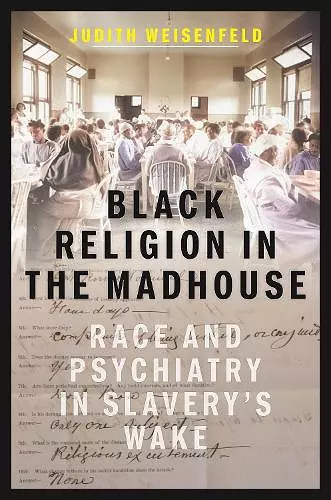Black Religion in the Madhouse
Race and Psychiatry in Slavery's Wake
Format:Hardback
Publisher:New York University Press
Publishing:29th Apr '25
£29.99
This title is due to be published on 29th April, and will be despatched as soon as possible.

How white psychiatrists pathologized African American religions
In the decades after the end of slavery, African Americans were committed to southern state mental hospitals at higher rates as white psychiatrists listed “religious excitement” among the most frequent causes of insanity for Black patients. At the same time, American popular culture and political discourse framed African American modes of spiritual power as fetishism and superstition, cast embodied worship as excessive or fanatical, and labeled new religious movements “cults,” unworthy of respect.
As Judith Weisenfeld argues in Black Religion in the Madhouse, psychiatrists’ notions of race and religion became inextricably intertwined in the decades after the end of slavery and into the twentieth century, and had profound impacts on the diagnosis, care, and treatment of Black patients. This book charts how racialized medical understandings of mental normalcy pathologized a range of Black religious beliefs, spiritual sensibilities, practices, and social organizations and framed them as manifestations of innate racial traits. Importantly, these characterizations were marshaled to help to limit the possibilities for Black self-determination, with white psychiatrists’ theories about African American religion and mental health being used to promote claims of Black people’s unfitness for freedom.
Drawing on extensive archival research, Black Religion in the Madhouse is the first book to expose how racist views of Black religion in slavery’s wake shaped the rise of psychiatry as an established and powerful profession.
Judith Weisenfeld’s indefatigable labor in the archives painstakingly populates the history of how psychiatrists developed their scientific field to maintain white racial supremacy in America by defining and confining Black spirituality under Jim and Jane Crow. . . . With field-shaping scholarly breadth and depth in social and cultural histories of Black religions, Weisenfeld sharpens and elevates our conversations about anti-Black racism in slavery’s wake beyond its many truisms to show how the rise of psychiatry not only depended upon the oppression of free Black people but also precipitated Black religious involvement with professional medicine and mental health activism in response. For Africana, religious, American, and medical studies, Black Religion in the Madhouse is crucial history. -- Vaughn A. Booker, author of Lift Every Voice and Swing: Black Musicians and Religious Culture in the Jazz Century.
Breaks new ground by documenting how American psychiatry institutionalized a specific form of racism—one that pathologized black religious expressions. The book’s genius is showing how these diagnostic categories evolved over time and reached beyond asylums, shaping African American experiences after the Civil War. Weisenfeld skillfully recovers and uplifts individuals from the sparse historical records of African American psychiatric cases, honoring them in powerful vignettes. This book is a game changer for our historical understandings of religion, race, and mental health. -- Kristy L. Slominski, author of Teaching Moral Sex: A History of Religion and Sex Education in the United States
Illuminates the often-overlooked intersection of religion, race, and psychology at the birth of U.S. psychiatry. Weisenfeld tells a compelling narrative of the historical pathologization of African American religiosity and how psychiatric ideas about rationality and irrationality came to shape dominant understandings of Black religions. . . . Both a monumental achievement of historical scholarship and deeply moving. . . . Invaluable for scholars U.S. religions but deserves to be read by practicing psychotherapists as well. . .I cannot recommend this book highly enough! -- Ira Helderman, author of Prescribing the Dharma: Psychotherapists, Buddhist Traditions, and Defining Religion
ISBN: 9781479829781
Dimensions: unknown
Weight: unknown
312 pages